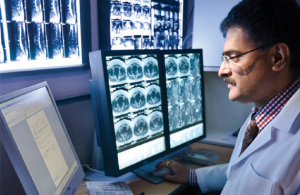Teamcenter® for Medical Devices to Increase Efficiency, Reduce Time-to-Market and Positively Impact the Bottom Line
The Teamcenter® for Medical Devices solution leverages powerful Teamcenter® foundation elements to deliver the most holistic and integrated solution for end-to-end management of the medical devices industry’s product lifecycle. Teamcenter® enables companies to fully trace all activities from concept to retirement by automatically linking compliance requirements with engineering and specification data. The solution combines compliance management, traceability and reporting capabilities to help medical devices manufacturers address strict quality and regulatory requirements, increasing competition and demanding time-to-market pressures.
Teamcenter® for Medical Devices facilitates comprehensive program lifecycle management, which in turn results in faster design cycles, accelerated time to regulatory agency approval, fewer design and submittal iterations and lower costs for design, development, manufacturing, testing and tracing.
Teamcenter® facilitates this strategic approach by tracking all of the product data that pertains to product development activities performed by a medical devices OEM and its suppliers. By integrating compliance management into a complete product lifecycle, Teamcenter® virtually eliminates manual data entry, improves data accuracy and reduces the costs of both compliance and non-compliance.
Speed PLM Implementation for Medical Device Design and Manufacturing
Medical devices catalyst provides medical device companies with best practices, process support and examples of how to facilitate PLM implementation.
Adhering to the necessary regulations associated with medical device design and manufacturing is a challenge. In fact, doing so and still being able to meet accelerating production rates and achieve speed-to-market can, at first glance, appear virtually impossible.
The Siemens PLM Software Integrated Quality solution effectively and efficiently assists medical device companies in the implementation of intelligent manufacturing and design processes. Our Integrated Quality solution provides a platform that allows you to increase quality; reduce risk; create alignment between requirements, product and manufacturing specifications, and production targets; while demonstrating compliance with industry quality standards. The medical devices (MD) catalyst accelerates time-to-value for implementing key elements of our Integrated Quality solution, while providing an environment for swift adoption of future software and technologies.
Effective medical device data management through intelligent software implementation
With ready-made, pre-configured templates for automated workflows, the MD catalyst offers medical device companies the ability to electronically and securely catalogue, manage and utilize design history files (DHFs) and device master records (DMR). This advanced medical device data management system speeds the design and manufacturing processes, while also helping eliminate overall complexity. In practical terms, records become easier to track, access and keep organized.
Personalized Product Innovation
Increased demand for personalized medical devices and pressure to offer lower-cost devices is pushing the medical device industry to support both build-to-stock and personalized products. “Personalized Product Innovation” enables companies to meet market demands faster and reduce the costs to create personalized devices.
Personalized Product Innovation is the Siemens PLM Software perspective on how medical device companies can provide support for personalized medical devices to complement their build-to-stock business. Our solutions for automating the image to implant process support Personalized Product Innovation by enabling a highly automated process for medical device companies to develop personalized medical devices and therapies. Beginning with a MRI or CT image of patient anatomy, and ending with personalized medical devices, our integrated product lifecycle management (PLM) platform and applications help you achieve speed and accuracy along the entire process chain.
Automating the Image to Implant Process
An automated process to develop, design and manufacture medical devices based on each patient’s anatomy.
A transformation is underway in the healthcare industry, as diagnoses and treatments become more personalized to adapt to patient-specific conditions. In response, medical device companies need to develop and deliver more personalized devices (such as surgical instruments or implants) in an efficient manner, meeting market demands and reducing costs.
In order for you to address this challenge, you will have to design and manufacture personalized medical devices faster and better. This will require additional business and technical systems than those traditionally used for build-to-stock devices.
Quality by Design
Narrow focus on the regulatory compliance aspects of quality management systems can leave gaps in important quality assurance processes during product development. “Quality by Design” enables companies to integrate quality management processes to their medical device product lifecycle management (PLM) system to identify and resolve quality issues earlier in the product lifecycle.
Quality by Design is the Siemens PLM Software perspective on how companies can take a more insightful, modern approach to ensuring medical device quality management by identifying and resolving quality issues as early as possible in the product design and manufacturing processes. Our Integrated Quality solution has raised the standards in software innovation for quality data and analytics management throughout the product lifecycle processes, as well as in the ultimate quest for the safest, most effective medical devices.
This balanced approach towards design and manufacturing quality supports faster production rates, significant reduction in cost of goods, and heightened levels of innovation. This all comes while still maintaining the highest levels of quality and safety associated with every device produced. By embedding quality data and analytics across all phases of product design and development, along with the core corrective and preventative actions (CAPA) and change control processes, true product innovation within the medical device community is a reality.
Maintaining the status quo and minimum regulatory standards are no longer effective quality control processes
In today’s global marketplace, medical device manufacturers are challenged to maintain quality controls consistently across all operations. Demand has increased for both product complexity and personalized product designs, so quality control processes are also becoming significantly more complex in terms of implementation and management. With established, early-stage regulatory systems checks that are executed in conjunction with best-in-class engineering practices, medical device quality has quickly become much more than ensuring minimum safety standards.
Critical-to-quality (CTQ) processes and systems are increasing in importance and must now be adopted for proactive quality assurance, in addition to the traditional, more reactive methods. Early-stage quality-focused analyses and action management is an effective overall strategy to increase efficiency, reduce auditory risk and eliminate sub-standard products.

